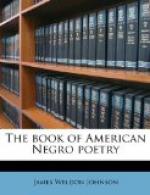Nevertheless, she was an ardent patriot. Her ode to General Washington (1775), her spirited poem, “On Major General Lee” (1776) and her poem, “Liberty and Peace,” written in celebration of the close of the war, reveal not only strong patriotic feeling but an understanding of the issues at stake. In her poem, “On Major General Lee,” she makes her hero reply thus to the taunts of the British commander into whose hands he has been delivered through treachery:
“O
arrogance of tongue!
And wild ambition, ever prone
to wrong!
Believ’st thou, chief,
that armies such as thine
Can stretch in dust that heaven-defended
line?
In vain allies may swarm from
distant lands,
And demons aid in formidable
bands,
Great as thou art, thou shun’st
the field of fame,
Disgrace to Britain and the
British name!
When offer’d combat
by the noble foe,
(Foe to misrule) why did the
sword forego
The easy conquest of the rebel-land?
Perhaps too easy for
thy martial hand.
What various causes to the
field invite!
For plunder you, and
we for freedom fight,
Her cause divine with generous
ardor fires,
And every bosom glows as she
inspires!
Already thousands of your
troops have fled
To the drear mansions of the
silent dead:
Columbia, too, beholds with
streaming eyes
Her heroes fall—’tis
freedom’s sacrifice!
So wills the power who with
convulsive storms
Shakes impious realms, and
nature’s face deforms;
Yet those brave troops, innum’rous
as the sands,
One soul inspires, one General
Chief commands;
Find in your train of boasted
heroes, one
To match the praise of Godlike
Washington.
Thrice happy Chief in whom
the virtues join,
And heaven taught prudence
speaks the man divine.”
What Phillis Wheatley failed to achieve is due in no small degree to her education and environment. Her mind was steeped in the classics; her verses are filled with classical and mythological allusions. She knew Ovid thoroughly and was familiar with other Latin authors. She must have known Alexander Pope by heart. And, too, she was reared and sheltered in a wealthy and cultured family,—a wealthy and cultured Boston family; she never had the opportunity to learn life; she never found out her own true relation to life and to her surroundings. And it should not be forgotten that she was only about thirty years old when she died. The impulsion or the compulsion that might have driven her genius off the worn paths, out on a journey of exploration, Phillis Wheatley never received. But, whatever her limitations, she merits more than America has accorded her.
Horton, who was born three years after Phillis Wheatley’s death, expressed in all of his poetry strong complaint at his condition of slavery and a deep longing for freedom. The following verses are typical of his style and his ability:




